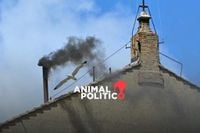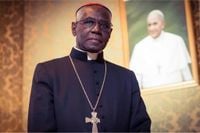On Thursday, May 8, 2025, thick black smoke emerged from the chimney of the Sistine Chapel, signaling that the 133 cardinals enclosed within had failed to elect a new pope. This was the second instance of black smoke, following the first that billowed out on Wednesday, May 7, 2025, after the initial voting session.
The atmosphere in St. Peter's Square was a mix of applause and disappointment as thousands gathered to witness the moment. Among the crowd, Marcela Tapia, a 46-year-old from Mexico, expressed her hopes for a resolution in the afternoon voting or by the morning of Friday, May 9, 2025. "This is very exciting," she said, reflecting the anticipation shared by many. Emmanuel Quirós, a 34-year-old priest from Costa Rica, was optimistic about the possibility of white smoke appearing later that day, although he emphasized the importance of choosing a pope who could unite the Church.
The cardinals are tasked with selecting a successor to Pope Francis, who passed away on April 21, 2025, at the age of 88. Until a new pope is chosen, the cardinals will conduct two rounds of voting in the morning and two in the afternoon. Voting resumed at 16:00 Vatican time (08:00 in Mexico) on Thursday, May 8, 2025. The cardinals will continue voting until someone secures the necessary two-thirds majority—89 votes—to become the 267th pope.
Historically, the elections of Benedict XVI in 2005 and the first Latin American pope in 2013 were resolved within two days, requiring four and five rounds of voting, respectively. However, the current conclave has been marked by tension and division, particularly following the reformist papacy of Jorge Mario Bergoglio. Despite having created around 80% of the voting cardinals, the factions within the Church—those favoring a more open approach and conservative elements—must find common ground.
The voting process is steeped in tradition. If a candidate achieves the required majority, their ballots are burned, producing white smoke. If no consensus is reached, the ballots are incinerated with chemicals that create black smoke. On Wednesday evening, approximately 50,000 people witnessed the first black smoke signal, while about 15,000 returned the following day, eager for news.
Elizabeth Ramos, a 45-year-old from Brazil, hopes the new pope will embody the qualities of the late Francis, who was known for his humble approach and ability to connect with youth. In contrast, Agustín, a 24-year-old economics student from France, expressed a preference for a more moderately conservative leader, stating, "The Church needs unity and strong values."
As the cardinals engage in their secretive deliberations within the Sistine Chapel, speculation arises about potential candidates. Initially, Cardinal Pietro Parolin, the Italian who served as Secretary of State under Francis, was seen as a frontrunner. However, other names have emerged, including Filipino Pablo Virgilio David, who could become the first Asian pope, and Spaniards Cristóbal López Romero and Ángel Fernández Artime.
On Wednesday, Giovanni Battista Re, Dean of the College of Cardinals, urged the electors to maintain the unity of the Church during this "difficult, complex, and tumultuous" time. The solemnity of the election is underscored by the ritualistic nature of the voting, which occurs in the presence of the frescoes of the Last Judgment, a powerful reminder of the weight of the cardinals' decision.
The conclave is not just a religious event but also a significant moment in the global Catholic community, which comprises approximately 1.4 billion members. The cardinals, representing 70 countries, are isolated from the outside world, having surrendered their phones and other means of communication to ensure secrecy throughout the process.
As the world watches, the cardinals will cast their votes, each one a step toward determining the future direction of the Catholic Church. The election of a new pope carries immense implications, particularly as the Church grapples with contemporary issues such as gender equality, the acceptance of the LGBTQ+ community, and the growing concerns surrounding climate change and migration.
In the lead-up to the conclave, various groups have sought to influence the cardinals' decision. Young Catholics have penned open letters reminding the prelates of the importance of including youth and laity in the Church's future. Additionally, survivors of clerical abuse have urged the cardinals to elect a leader committed to addressing the Church's history of misconduct.
As the voting continues, the cardinals face not only the challenge of selecting a new pope but also the responsibility of healing divisions within the Church. The next pontiff will need to navigate a complex landscape marked by differing ideologies and expectations from the global Catholic community.
While the current conclave may be characterized by uncertainty, the shared hope among the faithful remains clear: to find a leader who can guide the Church through its myriad challenges and foster a sense of unity and purpose among its members.
As the hours pass and the votes are cast, the anticipation builds. Will the next smoke signal bring news of a new pope, or will the cardinals need to continue their deliberations? The world waits with bated breath for the announcement that will mark the next chapter in the history of the Catholic Church.





